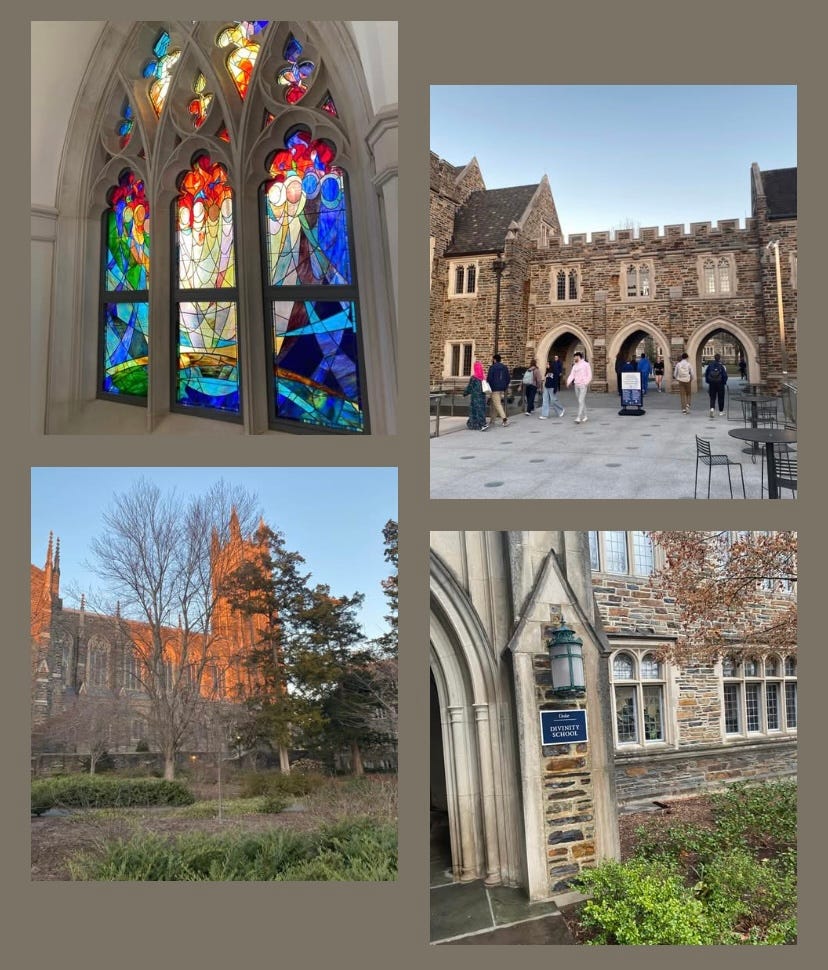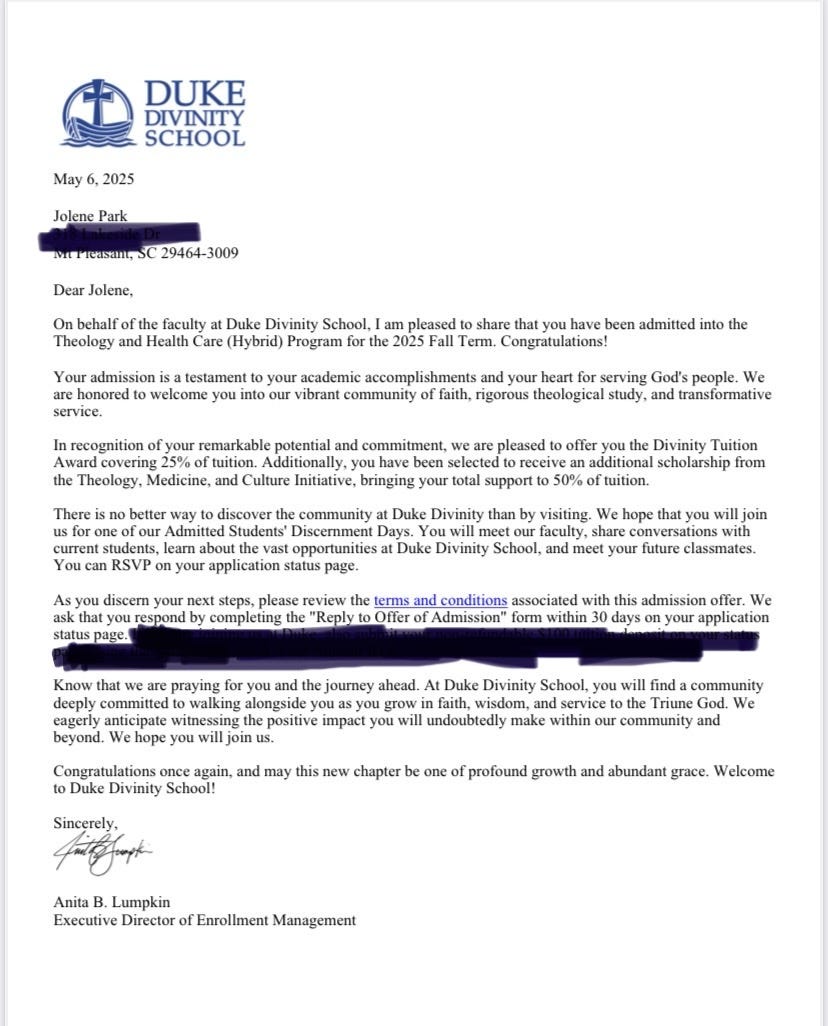Big News: I've Been Accepted to Duke Divinity School
I asked God to lead in 2025, and in less than six months, He brought me here...
Duke Chapel, Ash Wednesday. March 2025
I imagine you might read this headline and think, 'Well, this is out of the blue.' But it’s not, actually—not with the threads that have woven the tapestry of my life together over the years.
The 1,500-word essay I submitted as part of my application to Duke in April asked me to reflect on that tapestry, introducing myself and articulating my reasons for applying while considering my vocation in healthcare as it intersects with my current role as a practitioner. They asked me to explore my goals for pursuing this Graduate Degree in Theology, Medicine, and Culture (TMC), and to reflect on the people, ideas, books, experiences, and events that shaped my theological imagination and led me to this point.
I’m sharing my essay with you today. I just received my acceptance letter, and I can’t wait to begin studying at Duke Divinity School this August!
My Personal Statement for Duke Divinity’s Theology, Medicine, and Culture (TMC) Initiative
Who would have thought a routine conversation with my new chiropractor in February would introduce me to a program that focuses on a course of study I’ve been seeking for quite some time? But it did. After exploring Duke’s Theology, Medicine, and Culture (TMC) Initiative, I realized I had found a curriculum that aligns with my interests in health, Christian scripture and history, and theology.
This part of my story begins in 1993, when I visited Gloucester Cathedral in England on Christmas Eve. The candlelight service, utilizing traditional liturgy in that 500-year-old chapel, felt particularly sacred and magnificent, unlike anything I had experienced in my Presbyterian upbringing in rural Colorado.
Shortly after that, I began my career in corporate wellness. I discovered that I had a talent for blending ideas from different areas of study and creating more effective solutions, processes, and a better way of life—a comprehensive approach to health and well-being. However, it took me 20 years to return to regularly attending a traditional church again.
In 2017, weary and overwhelmed by the weight of solo entrepreneurship, I found my way to the Episcopal Cathedral in downtown Denver on Ash Wednesday. God was pursuing me through cathedrals and liturgy—tears welled up as I was moved again by that experience.
When I relocated to Charleston in 2021, I began attending St. Philip's Anglican Church. For the first time in my life, I immersed myself in learning the origins of the Christian faith, reading the Bible via the Bible Recap One Year Plan, and falling in love with the overarching, unifying story woven together in the Old and New Testaments. I began participating in all the studies and programs the church offered. I made a pilgrimage to the Holy Land with my Rector in 2023. Walking the Via Dolorosa, visiting Caesarea Philippi, and the Church of the Holy Sepulchre deepened my appreciation for the intersection between spiritual and physical restoration. Similarly, the time I spent at Iona Abbey in Scotland and with the Brigidine Sisters in Kildare, Ireland, a couple of years prior sparked my interest in merging traditional Christian practices with modern therapeutic resources.
Which brings me to today. Twenty-five years into my health and wellness career and 32 years after that experience at Gloucester Cathedral, I realize how beneficial a deeper study of theology will be as I connect the physical and spiritual aspects in my work, offering an even more comprehensive healing approach.
Through my health coaching programs and training workshops, I empower individuals to challenge the status quo and cultivate curiosity about the factors necessary to enhance their body, mind, and spirit. Change happens through action and application. Well-resourced people can develop the courage to rethink outdated patterns and embrace healthier, more fulfilling lives.
I founded my health consulting company, Healthy Discoveries, in 2001 with a vision of becoming the “Dale Carnegie” of corporate wellness programs. My professional breakthrough came in 2004 when Owens & Minor, a Fortune 500 medical supply company, contracted me to present a full-day corporate wellness workshop for their executive team. The success of that event led to a seven-year training contract, launching my career as a corporate wellness consultant. Since then, I’ve provided training programs for companies such as Compassion International, Lockheed Martin, and Chipotle, as well as keynote speeches for groups like the internal medicine residents at Virginia Commonwealth University. In 2012, as the Employee Wellness Director for the City of Lakewood, Colorado, I redesigned their wellness program, increasing participation by 78% and earning Cigna’s “Colorado Employee Wellness Program of the Year” award.
While my career began in corporate wellness, my work has since evolved into a focus on Gray Area Drinking. In 2014, I quit drinking—not because of a rock-bottom moment, but from a deep inner knowing that I didn’t want to drink anymore. That decision became a pivotal turning point in my life and career. As a pioneer in the alcohol free wellness movement, I introduced the concept of Gray Area Drinking to a global audience through my 2017 TED Talk, which now has nearly 500,000 views. In that talk, I share my NOURISH Method—a holistic approach to healing the craving brain through neurotransmitter and nervous system balance:
Notice nature
Observe your breath
Unite with others
Replenish with food
Initiate movement
Sit in stillness
Harness your creativity
Since 2016, I’ve trained thousands of people—clients, fellow coaches, and practitioners—to integrate my NOURISH Method into their lives and the lives of their clients. My method applies to anyone using a maladaptive coping behavior, whether it’s alcohol, excessive screen time, too much sugar, workaholism, or something else.
When I started this work with Gray Area Drinkers a decade ago, I saw the missing piece in the alcohol-free space as physiological—neurotransmitter balance and nervous system regulation. Today, I believe we are missing another essential piece—the spiritual.
The current spiritual landscape in the alcohol free recovery space is dominated by the 12-step model or New Age, New Thought philosophy. The other spiritual option is the modern-day church. But what do people do if they have been wounded by the church? I believe the TMC Initiative at Duke can help me create a bridge for a theologically sound spiritual resource that people can’t find elsewhere.
My clients are drawn to the term Gray Area Drinking because it’s an inviting and resonant language that doesn’t invoke shame or stigma. As I explore and discern how to bring more inspiring, inviting, and healing spiritual elements into my work, I feel confident that this program can help me.
One area I’m particularly interested in is the lost wisdom and ancient traditions of Medieval and early Christianity, as described by Chris R. Armstrong in his book, Medieval Wisdom for Modern Christians: Finding Faith in a Forgotten Age, with C.S. Lewis. After years of my wayward sojourning, the wisdom of ancient texts, meaningful stories, and positive community experiences connected me back to God.
When I gaze at Rembrandt's painting of the father and two sons as described in Henri Nouwen’s book The Return of the Prodigal Son, I find spiritual comfort in both the story and the painting.
When I read about the 12th-century Saint and Doctor of the Church, Hildegard of Bingen in Dr. Virginia Sweet’s book, God’s Hotel—a true story about how Dr. Sweet used Hildegard’s medieval perspectives to treat the body as an integrated whole, not just a machine that needs to be fixed—it is a powerful reminder of how healing can occur simply from being in the loving presence of others. It reminds me of Dr. Warren Kinghorn’s work and book, Wayfaring: A Christian Approach to Mental Health Care.
When I use the Psalms as a foundation for daily prayer, as the early church did, I enjoy a writing practice taught by Donald Whitney in his small but excellent book, Praying the Bible.
These are just a few of the inspiring, inviting, and healing spiritual elements that complement the nervous system work that I’m doing. I aim to deepen this physiological and theological connection in my client sessions, retreats, and in the book I’m writing, Breaking Free from Gray Area Drinking.
But I can’t do this alone. I’ve built my career mainly on my own. The digital, virtual world where I do most of my work can be lonely, especially in the hustle and influencer culture. The course materials, discussions, and spiritual formation within my Duke cohort will certainly serve my vocation and well-being. Most importantly, I would love the opportunity to explore the topics of trauma, early adversity, burnout, substance use, death, dying, depression, and anxiety from both the medical and theological points of view.
This year on Ash Wednesday, I sat in the stillness of the gorgeous Duke Chapel. I had just finished my campus visit at the Divinity School the day before. I realized it was eight years ago, in an Ash Wednesday service across the country, that launched my journey back to traditional Christianity. And now, here I am at Duke, applying to the Divinity School. God continues to move in my life. Even when I wasn’t pursuing Him, He never stopped pursuing me.
I would be honored and beyond excited to study, contribute, and grow personally and professionally through the curriculum, world-class faculty, and nourishing community and fellowship within the Theology, Medicine, and Culture Initiative at Duke University in the 2025-26 academic year.
~Jolene Park







Congratulations, Jolene. I was at Duke for my M.Div. 2010-2013, and it was an incredible place to be and study, the community was great. My life has taken some twists and turns since then re: that path, but have fond memories of my time there. Wishing you the best and excited for your new journey.
Congrats Jolene! So excited for your new chapter on this amazing journey you have choosen.